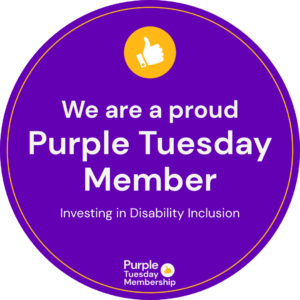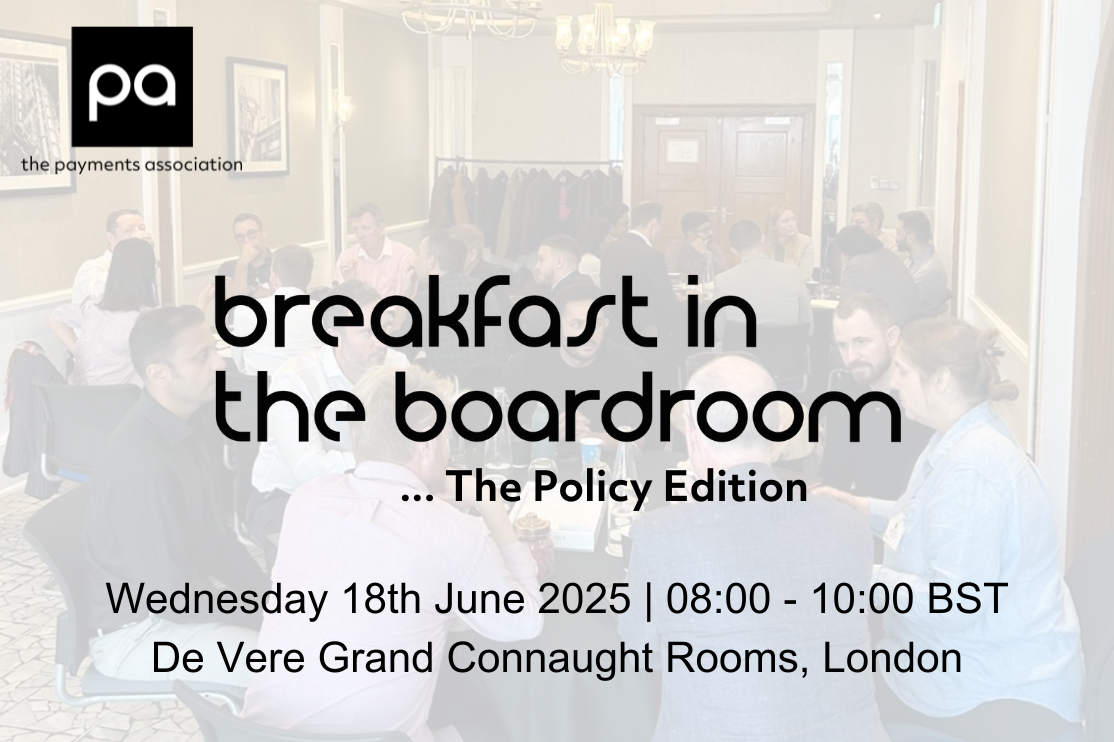Advisory Board Nominees 2024

Andrew Murray
Head of Sales Growth Office - Corporate & International Banking
FIS
Why do you want to become a member of The Payments Association Advisory Board?
What do you see as the main challenges The Payments Association should focus on in the year ahead?
What will you bring to the Advisory Board?

Cassie Craddock
Managing Director, Europe
Ripple
Why do you want to become a member of The Payments Association Advisory Board?
What do you see as the main challenges The Payments Association should focus on in the year ahead?
What will you bring to the Advisory Board?

Chris Partridge
Senior Vice President - Division Leader
Crown Agents Bank
Why do you want to become a member of The Payments Association Advisory Board?
What do you see as the main challenges The Payments Association should focus on in the year ahead?
What will you bring to the Advisory Board?
Chris will bring a global perspective on payments – with a strong understanding of the UK as a baseline. Chris has 15 years of payment knowledge across many payments disciplines including business development, product and operations.

Christophe L’Helguen
Division Head Issuing, Board member of Worldline Financial Services
Worldline
Why do you want to become a member of The Payments Association Advisory Board?
What do you see as the main challenges The Payments Association should focus on in the year ahead?
What will you bring to the Advisory Board?

Claire Gates
Global Head of Payments and Solutions
Crown Agents Bank
Why do you want to become a member of The Payments Association Advisory Board?
What do you see as the main challenges The Payments Association should focus on in the year ahead?
What will you bring to the Advisory Board?

Dmitry Tsymber
Founder
MultiPass
Why do you want to become a member of The Payments Association Advisory Board?
What do you see as the main challenges The Payments Association should focus on in the year ahead?
What will you bring to the Advisory Board?

Elkhan Nasibov
Chief Compliance Officer and MLRO
Guavapay
Why do you want to become a member of The Payments Association Advisory Board?
What do you see as the main challenges The Payments Association should focus on in the year ahead?
What will you bring to the Advisory Board?

Emily Corfield
Head of Financial Institutions Sales EMEA
StoneX Payments
Why do you want to become a member of The Payments Association Advisory Board?
What do you see as the main challenges The Payments Association should focus on in the year ahead?
What will you bring to the Advisory Board?

Gary Palmer
CEO and Founder
Payall Payment Systems Inc.
Why do you want to become a member of The Payments Association Advisory Board?
As the founder and CEO of Payall Payment Systems, which has built world-first end-to-end software infrastructure for cross-border payments, I am passionate about advancing the global payments industry. I believe the Payments Association can play a pivotal role in shaping the future of payments, ensuring that cross-border payments become safer, faster, more efficient (fast and low-cost to the system) and inclusive. With decades of experience in banktech, regtech, and fintech, I aim to contribute my expertise in cross-border payments, regulatory compliance, and innovation to help drive impactful change within the payments ecosystem.
What do you see as the main challenges The Payments Association should focus on in the year ahead?
I believe The Payments Association should focus on addressing the critical lack of software infrastructure and specific technologies needed to make local and international payments safe, transparent, and accessible. Current systems often fail to provide the necessary speed, security, and cost-efficiency required, especially in cross-border transactions. This has left many people and regions excluded from the global banking system. The Association should work on promoting new software and technology innovations that close this gap, ensuring financial services reach underserved populations while reducing inefficiencies in international payments. Addressing these foundational issues will be key to creating a more inclusive, reliable, and transparent global payments network.
What will you bring to the Advisory Board?
With over two decades of experience in fintech, including founding companies like Payall and WildCard Systems, I bring a deep understanding of cross-border payment systems, banking, compliance, and innovation. My work has centered on building breakthrough solutions that enhance payment security, efficiency, and transparency. As a seasoned entrepreneur and industry advisor to the Philadelphia Federal Reserve Bank, I bring a strong track record of leadership and collaboration, along with a global network that can help broaden the influence of the Payments Association.

Hugo Remi
CEO
Cardaq Limited
Why do you want to become a member of The Payments Association Advisory Board?
Because it is whole my life, I am doing it for already 18 years and have build many financial companies and worked with the world well known brands. I would like to share my experience and contribute to the Payments Association the make the United Kingdom landmark the best for the FinTech in Europe and the whole world.
What do you see as the main challenges The Payments Association should focus on in the year ahead?
To compete with the European Union and challenge it, we need to build much better regulatory environment and sign up for the new alternarnative union that was offered before the Brexit with the United States, Canada, Australia and New Zealand.
What will you bring to the Advisory Board?
Vision and development of the UK FinTech outside the United Kingdom.

James Marchant
Deputy CEO & Chief Commercial Officer
nChain
Why do you want to become a member of The Payments Association Advisory Board?
What do you see as the main challenges The Payments Association should focus on in the year ahead?
What will you bring to the Advisory Board?

Jazmin Achi
Chief Operating Officer
Privat 3 Money
Why do you want to become a member of The Payments Association Advisory Board?
What do you see as the main challenges The Payments Association should focus on in the year ahead?
What will you bring to the Advisory Board?

Johannes Kolbeinsson
CEO, co-founder
PAYSTRAX
Why do you want to become a member of The Payments Association Advisory Board?
What do you see as the main challenges The Payments Association should focus on in the year ahead?
What will you bring to the Advisory Board?

Juspal Manic
President EMEA & APAC
Featurespace
Why do you want to become a member of The Payments Association Advisory Board?
What do you see as the main challenges The Payments Association should focus on in the year ahead?
What will you bring to the Advisory Board?

Kirill Lisitsyn
Co-founder & CEO
Torus
Why do you want to become a member of The Payments Association Advisory Board?
What do you see as the main challenges The Payments Association should focus on in the year ahead?
What will you bring to the Advisory Board?

Lorraine Mouat
Head of Payment Services
Thistle Initiatives
Why do you want to become a member of The Payments Association Advisory Board?
What do you see as the main challenges The Payments Association should focus on in the year ahead?
What will you bring to the Advisory Board?
Energy, enthusiasm, pragamtism, experience and a solid grounding in the world of payments. Having been in financial services operations, compliance and now as a consultant, I will bring over 25 years of regulatory expertise and a keen desire to do the best for this sector, whilst remaining realistic and considered.

Louise Hill
Co-Founder and CEO
GoHenry
Why do you want to become a member of The Payments Association Advisory Board?
What do you see as the main challenges The Payments Association should focus on in the year ahead?
What will you bring to the Advisory Board?

Michael Galvin
Co-Founder and Chief Partnership Officer
Toqio
Why do you want to become a member of The Payments Association Advisory Board?
What do you see as the main challenges The Payments Association should focus on in the year ahead?
What will you bring to the Advisory Board?

Michael Rolph
CEO
Monavate
Why do you want to become a member of The Payments Association Advisory Board?
What do you see as the main challenges The Payments Association should focus on in the year ahead?
What will you bring to the Advisory Board?

Mike Shafro
CEO and Founder
xpate
Why do you want to become a member of The Payments Association Advisory Board?
As the CEO of xpate, I’ve seen firsthand how digital businesses are transforming global commerce. However, they face unique challenges, especially in gaining access to traditional financial infrastructure. The Payments Association is uniquely positioned to influence industry standards, advocate for emerging payment technologies, and create opportunities for collaboration across the ecosystem. I want to contribute xpate’s innovative perspective and help shape the future of the payments industry by fostering greater inclusivity, transparency, and efficiency for digital-first businesses.
What do you see as the main challenges The Payments Association should focus on in the year ahead?
What will you bring to the Advisory Board?
I bring over a decade of experience in building and scaling xpate, a global payments platform designed to simplify complex financial processes for digital businesses. My expertise spans fintech innovation, payments infrastructure, multi-currency support, and global expansion. xpate’s focus on accessibility and simplifying financial operations gives me unique insights into the needs of modern digital businesses—whether they’re online retailers, SaaS companies, or fintech startups. Additionally, my international experience allows me to offer a global perspective on regulatory challenges and emerging payment trends across diverse markets.

Neil Wake
CEO
Dialect Communications Limited
Why do you want to become a member of The Payments Association Advisory Board?
What do you see as the main challenges The Payments Association should focus on in the year ahead?
What will you bring to the Advisory Board?
Joining the PA advisory board offers me the chance to influence industry direction, expand my network, and stay ahead of trends, all while giving back to the sector that has defined my own career. It provides a platform for contributing my own hard-earned expertise to shape the future of payments while simultaneously enriching my own personal and professional growth. Finally my continued focus on being the ‘voice of the customer’ will hopefully help the PA companies to constantly review their product, process and experience to keep end customers at the forefront of their minds.

Nick Charteris
CEO
Optimus
Why do you want to become a member of The Payments Association Advisory Board?
What do you see as the main challenges The Payments Association should focus on in the year ahead?
What will you bring to the Advisory Board?

Rebecca Hickman
Partner
Addleshaw Goddard
Why do you want to become a member of The Payments Association Advisory Board?
What do you see as the main challenges The Payments Association should focus on in the year ahead?
What will you bring to the Advisory Board?

Rebecca Marriott
CRO and MLRO
Tide
Why do you want to become a member of The Payments Association Advisory Board?
I think it’s a good opportunity to work with industry peers to hopefully drive change and influence. I’ve seen the work TPA have done on APPF and it’s impressive. I feel strongly there’s some significant challenges ahead related to APPF especially, and crucially the impact on competition and FinTechs, which I’d like to help shape.
What do you see as the main challenges The Payments Association should focus on in the year ahead?
What will you bring to the Advisory Board?
8 years of FinTech experience, working for a leading FinTech at exec level, good understanding of the FinTech sector and strong network in particularly risk and financial crime. Understanding of the regulators.

Robert White
General Manager/CEO
PagoNxt, part of Santander
Why do you want to become a member of The Payments Association Advisory Board?
What do you see as the main challenges The Payments Association should focus on in the year ahead?
What will you bring to the Advisory Board?

Rowan Brewer
Chairman
Paymentology
Why do you want to become a member of The Payments Association Advisory Board?
What do you see as the main challenges The Payments Association should focus on in the year ahead?
What will you bring to the Advisory Board?

Samuel Barrett
CEO
Paytently
Why do you want to become a member of The Payments Association Advisory Board?
What do you see as the main challenges The Payments Association should focus on in the year ahead?
What will you bring to the Advisory Board?

Tribh Grewal
Head of Fintech Partnerships
Discover Global Network
Why do you want to become a member of The Payments Association Advisory Board?
What do you see as the main challenges The Payments Association should focus on in the year ahead?
What will you bring to the Advisory Board?

Will Marwick
Chief Executive Officer
IFX Payments
Why do you want to become a member of The Payments Association Advisory Board?
What do you see as the main challenges The Payments Association should focus on in the year ahead?
What will you bring to the Advisory Board?






























